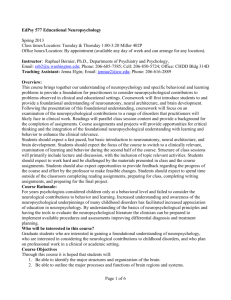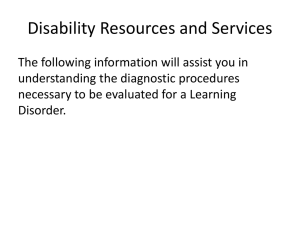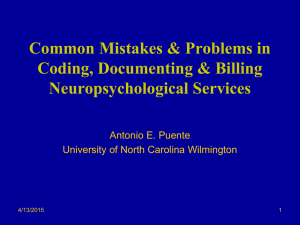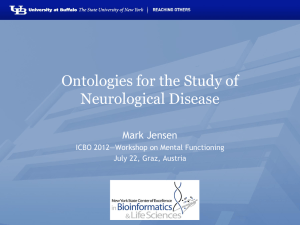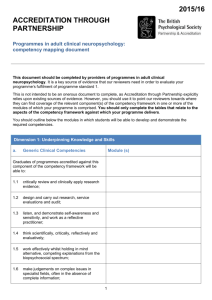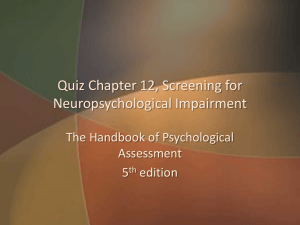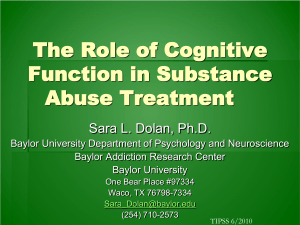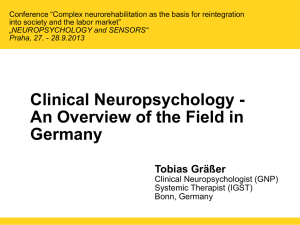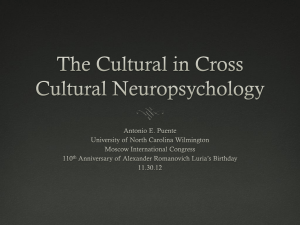Competency mapping document - paediatric clinical neuropsychology
advertisement
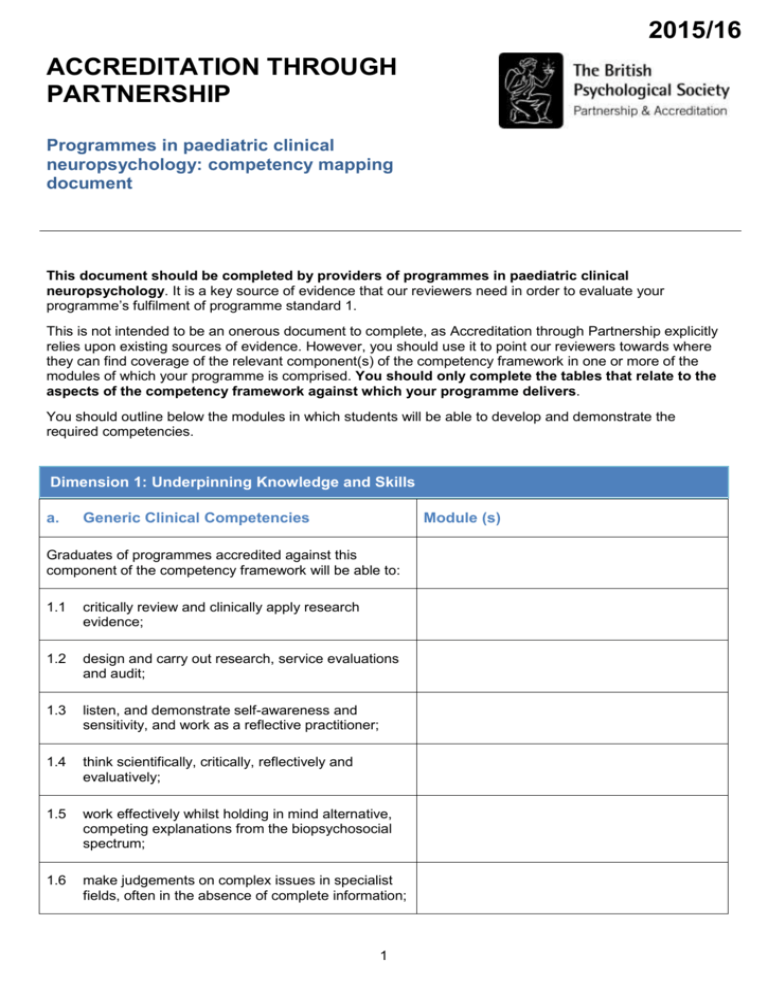
2015/16 ACCREDITATION THROUGH PARTNERSHIP Programmes in paediatric clinical neuropsychology: competency mapping document This document should be completed by providers of programmes in paediatric clinical neuropsychology. It is a key source of evidence that our reviewers need in order to evaluate your programme’s fulfilment of programme standard 1. This is not intended to be an onerous document to complete, as Accreditation through Partnership explicitly relies upon existing sources of evidence. However, you should use it to point our reviewers towards where they can find coverage of the relevant component(s) of the competency framework in one or more of the modules of which your programme is comprised. You should only complete the tables that relate to the aspects of the competency framework against which your programme delivers. You should outline below the modules in which students will be able to develop and demonstrate the required competencies. Dimension 1: Underpinning Knowledge and Skills a. Generic Clinical Competencies Module (s) Graduates of programmes accredited against this component of the competency framework will be able to: 1.1 critically review and clinically apply research evidence; 1.2 design and carry out research, service evaluations and audit; 1.3 listen, and demonstrate self-awareness and sensitivity, and work as a reflective practitioner; 1.4 think scientifically, critically, reflectively and evaluatively; 1.5 work effectively whilst holding in mind alternative, competing explanations from the biopsychosocial spectrum; 1.6 make judgements on complex issues in specialist fields, often in the absence of complete information; 1 1.7 exercise personal responsibility and largely autonomous initiative in complex and unpredictable situations; and 1.8 generalise and synthesise prior knowledge and experience in order to apply it critically and creatively in different settings and novel situations. They will also demonstrate an understanding of: 1.9 the supervision process for supervisee and supervisor roles, and be able to provide supervision at an appropriate level within their own sphere of competence; 1.10 relevant psychological theory, including: knowledge of biological psychology, human performance, health psychology, behavioural psychology, disability issues and adjustment models; and detailed knowledge of current models of normal cognitive function to facilitate an understanding of the approaches, models and findings of cognitive neuropsychology, together with their clinical implications; and 1.11 theories and models of leadership and change processes, and their application to service development and delivery. b. Neuropsychological Competencies Module (s) Graduates of programmes accredited against this component of the competency framework will demonstrate an understanding of the following: 1.12 Understand the historical and theoretical foundations of developmental cognitive neuroscience, including understanding early neural development, basic functional neuroanatomy, basic neurochemistry and psychopharmacology, and basic neurobiology and genetics. Sufficient knowledge of the basic principles of neuroscience should be demonstrated for four purposes: (i) to enable understanding of the neuroscience literature as it pertains to neuropsychological issues; (ii) to facilitate understanding of communications 2 from colleagues working in allied disciplines; (iii) to appreciate the medical evidence as it relates to a particular client; and (iv) to contribute to relevant discussions about the care, management and rehabilitation of particular clients. As important as this general knowledge is the ability to access sources of more detailed information which may be required in considering the case of an individual client. 1.13 Understand the terminologies, methodologies and paradigms relevant to the study of developmental brain/behaviour relationships. This may include: neuroimaging; electrophysiology; quantitative structural and functional neuroimaging; quantitative electrophysiology, including event related paradigms; experimental cognitive techniques; and/or molecular genetic engineering techniques. 1.14 Understand the major theories of brain/behaviour development and how they inform approaches to neuropsychological assessment and interpretation of data. Developmental cognitive neuroscience provides the scientific knowledge underpinning contemporary paediatric neuropsychology practice. Graduates should therefore understand the historical, theoretical and methodological foundations of developmental cognitive neuroscience. 1.15 Understand the neuroanatomical development of each sensory, motor and cognitive neural system, and the integration of systems. Graduates should understand: (i) key concepts of developmental processes, synaptic transmission and neuroanatomical organisation in the sensory systems including: vision; audition; somatosensory/pain; motor systems; and integration of sensory systems; and (ii) neural cognitive systems and emergent cognitive skills including: visual cognition; language; memory; movement and motor planning; attention/executive function; social and emotional processing; and literacy, numeracy and written formulation. 1.16 Understand major theories of normal cognitive learning and brain development, which may include those of Piaget, Hebb and Luria. 1.17 Understand the competing processes involved in restoration after early injury or abnormal 3 compensation within each neural-cognitive or motor system at different stages of development. This should include an understanding of the principles of neural plasticity and reorganisation of function following injury, for example, potential crowding and sleeper effects. 1.18 Understand the relationship between underlying neuropathology and cognitive outcome. Graduates should understand how neuropsychological outcome is shaped by aetiological factors and the underlying neuropathology in a range of developmental and acquired brain disorders, including, for example, the latest findings in neuropsychological outcome following neurosurgical treatment. 1.19 Understand psychometric and statistical principles. Knowledge of psychometric principles may include the following, for example: understanding the purpose of expressing test scores using a common metric; understanding the most commonly used standard metrics (z scores, T scores, Standard Wechsler scores, IQ scores, Sten scores, Percentile Ranks); understanding the meaning and limitations of age-equivalent scores; understanding the distinction between absolute levels of functioning and scores referenced to age norms; understanding how to convert scores on one metric to another; understanding the concept of standard error of measurement and how it is calculated; understanding how one can determine whether test scores are reliably different; understanding of the processes for distinguishing normal and abnormal trajectories of cognitive development; understanding the importance of the distinction between the reliability and abnormality of test score differences; understanding the base rate issue when multiple tests are employed; understanding the factors influencing attempts 4 to measure change in test performance; understanding the use of regression in measuring change in the individual case (including interpretation of change in test scores taken at different chronological ages); understanding of the relative value of different sources of validity information in diagnostic testing; understanding the sensitivity and specificity of tests; and/or understanding the role of base rates and the use of Bayes’ theorem in diagnostic testing. 1.20 Understand contemporary models/frameworks of health, disability and participation, for example, the International Classification of Functioning, Disability and Health [ICF], (World Health Organisation, 2001). Graduates must also understand the legislative context for providing educational support for children in state schools (e.g. special educational needs and disability act, SENDIST). 1.21 Understand all aspects of common neurodevelopmental, neuropsychological, neurological, and neuropsychiatric conditions. (i) Examples of common neurodevelopmental disorders may include: specific language impairment; non-verbal learning difficulties; attention deficit disorders; and/or autistic spectrum disorders. (ii) Examples of common neuropsychological disorders may include: visual and perceptual disorders (e.g. agnosia, prosopagnosia); language and motor speech disorders (e.g. expressive/receptive dysphasia, verbal dyspraxia, dysarthria); memory disorders (e.g. material-specific deficits, amnesia); movement and motor planning disorders (e.g. dyspraxia, chorea); attention disorders (e.g. neglect); executive function disorders (e.g. action monitoring, impulse control, planning, perseveration); social and emotional processing disorders (e.g. social communication disorders, affective disorders, panic and anxiety disorders); and/or literacy, numeracy and writing disorders (e.g. deep and surface dyslexia, dyscalculia, dysgraphia). (iii) Neuropsychological disorders should be examined in a range of neurological conditions which may include: epilepsy syndromes and surgical interventions; hydrocephalus; brain 5 tumours; cerebrovascular disorders; neuromuscular disorders; movement disorders; neurometabolic disorders; and/or traumatic brain injury. (iv) Examples of common neuropsychiatric disorders may include: anxiety; depression; and/or childhood schizophrenia. 1.22 Understanding of specialist assessment for infants and children at risk of developmental delay. Graduates should have knowledge of: (i) Specialised assessment and support strategies for infants and children at risk of developmental delay who may require early neurodevelopmental assessment. (ii) The principles and practice of clinical neurodevelopmental assessment batteries that measure sequential neurodevelopmental steps in early cognitive, language and motor development should be understood and how these compare to the measurements of cognitive dissociations in neuropsychological assessment. (iii) Cognitive neuroscience techniques using behavioural and electrophysiological methods to assess timing and organisation of very early cognitive skills with experimental paradigms such as visual paired comparisons, deferred imitation, A not B task, Event Related Potential (ERP) paradigms. Dimension 2: Clinical work a. Generic Clinical Competencies Module (s) Graduates of programmes accredited against this component of the competency framework will be able to: 2.1 develop and sustain professional relationships; 2.2 work effectively in multi-disciplinary teams; 2.3 work effectively with formal service systems and procedures; 2.4 adapt practice to a range of organisational contexts, on the basis of an understanding of 6 pertinent organisational and cultural issues; 2.5 bring about change for individuals, children, young people and their families by working at different levels (e.g. individuals, families, groups, communities, organisations, local authorities and national priorities), including the ability to work systemically in different contexts and settings; 2.6 engage children, young people and their carers as active participants in assessment and decision-making processes, and in the evaluation of interventions and service delivery; 2.7 choose, use and interpret a broad range of assessment methods appropriate to the client and service delivery system in which the assessment takes place and to the type of intervention which is likely to be required, including: formal procedures (use of standardised psychometric instruments); systematic interviewing procedures; other structured methods of assessment (e.g. observation, or gathering information from others); understanding the relevance of behavioural assessment or observation in multiple contexts (e.g. clinic, home and school); assessment of social context and organisation; and understanding typical biases affecting parental and teacher reports and the factors which may influence the validity and reliability of third party reports. 2.8 decide, using a broad evidence and knowledge base, how to assess, formulate and intervene psychologically, from a range of possible models and modes of intervention with clients, carers and service systems; 2.9 develop formulations which integrate information from assessments within a coherent framework that draws upon psychological and neuropsychological theory; 7 2.10 direct, co-ordinate, support or facilitate teams together with an understanding of the principles of operation within a multidisciplinary or management team; 2.11 recognise when (further) intervention is inappropriate, or unlikely to be helpful, and communicate this sensitively; and 2.12 select and implement appropriate methods to evaluate the effectiveness, acceptability and broader impact of interventions at a service and organisational level, and using this information to inform and shape practice and service development. Where appropriate this will also involve devising innovative procedures. This includes the ability to formulate interventions that focus on applying knowledge, skills and expertise to support identified local and national initiatives. They will also demonstrate knowledge of: 2.13 factors which must be considered in selecting an intervention and knowledge of barriers to intervention; and 2.14 procedures by which the progress of and outcomes from an intervention may be assessed at the client level [individuals, groups and families]. b. Neuropsychological Competencies Module (s) Graduates of programmes accredited against this component of the competency framework will demonstrate the following: 2.15 Ability to demonstrate a holistic understanding of the social, psychological, cognitive and educational impact of acquired brain injury and neurological conditions both for children/young people and systems, which may include, for example, understanding: the prevalence and diagnosis of behaviour problems which can emerge after acquired brain injury/neurological impairment; the range of factors, including systemic, emotional and cognitive, that may contribute to the development of behaviour problems after acquired brain 8 injury/neurological impairment; how to assess problems of anger and aggression and emotional consequences of childhood acquired brain injury/neurological impairment; the evidence base relating the main approaches to the management of emotional and behavioural disturbance following acquired brain injury/neurological impairment (anger and aggression) including pharmacological, psychological therapy and behaviour management approaches; the most common psychosocial consequences of acquired brain injury/neurological impairment including changes in behaviour, personality and psychiatric disorders; common family, educational and other systemic difficulties which may arise following childhood acquired brain injury/neurological impairment; and/or the impact of acquired brain injury/neurological conditions on family functioning, personal, educational and social relationships and community participation. 2.16 Ability to identify cognitive impairment, behavioural changes and emotional difficulties and provide integrated psychological/ neuropsychological approaches to manage these. Neuropsychological assessment competencies 2.17 Ability to tailor neuropsychological assessment to clients and to address appropriate questions. 2.18 Ability to understand neuropsychological assessment including the psychometric principles of neuropsychological assessment and the measurement of cognitive change during development. (i) Understanding of neuropsychological assessment may include, for example: 9 understanding the underpinning principles of neuropsychological assessment in children and adolescents, and the many variables involved in the administration, interpretation and reporting of neuropsychological assessments; demonstrating a critical understanding of clinical assessment techniques using commercially available neurodevelopmental batteries; demonstrating an applied understanding of the specialised assessment and support strategies for infants and children at risk of developmental delay who require early neurodevelopmental assessment; understanding the principles and practice of clinical neurodevelopmental assessment batteries that measure sequential neurodevelopmental steps in early cognitive, language and motor development, and how these compare to the measurements of cognitive dissociations in neuropsychological assessment; and/or understanding how experimental applications such as Event Related Potentials and visual paired comparisons are used to assess attention, timing and organisation of very early cognitive skills in infants. (ii) In addition to a sound knowledge of psychometric and statistical principles (see competency 1.20), graduates’ understanding of psychometric principles in relation to neuropsychological assessment may also include, for example: familiarity with an adequate range of the assessment instruments employed in general paediatric neuropsychological practice; and the ability to evaluate the strengths and weaknesses of new test batteries as they are developed. (iii) Knowledge of the psychometric principles underpinning the selection, administration 10 and interpretation of cognitive test scores may include, for example: understanding test manual and other published data in order to critically appraise the psychometric properties of commonly used neuropsychological tests; appreciating the strengths and limitations of a range of commonly used cognitive tests; understanding the concept of reliability/stability of neuropsychological tests and how these are determined understanding the effects of age and IQ on reliability and validity of cognitive tests; understanding the particular influence of engagement and comprehension of instructions and concepts on the validity of tests across the lifespan; and/or understanding the validity of cognitive constructs e.g. executive function, as applied to your children. 2.19 Ability to understand neurodevelopmental assessment batteries and how these differ from neuropsychological measures. 2.20 Ability to understand how to integrate neuropsychological data with other measures of brain function to improve diagnosis and prognosis. 2.21 Ability to understand and administer the tools used to assess different components of cognition and behaviour, and ability to evaluate new tools as they are developed. Graduates must demonstrate a thorough and comprehensive knowledge of the assessment procedures adopted in paediatric clinical neuropsychology. They should already possess a sound knowledge of psychometric and statistical principles (see competency 1.18) and must in addition be familiar with an adequate range of the assessment instruments employed in general clinical neuropsychological practice. They must also show an understanding about the assessment of change over time and issues related to 11 repeat assessment and monitoring progress. 2.22 Ability to understand the range of factors that affect a child/young person’s performance on neuropsychological/neurodevelopmental tests. Graduates must understand the range of information over and above cognitive test results that should be obtained as part of a neuropsychological assessment. For example, this may include: medication; individual or family mental health difficulties; developmental history (social emotional and cognitive development); medical history (including birth trauma, physical health problems); educational history and attainment; family history; coping styles; bilingualism; cultural biases; and/or other factors related to diversity. 2.23 Ability to understand the expected neuropsychological profiles associated with a range of neurological, neurodevelopmental and neuropsychiatric. Graduates should understand how neuropsychological outcome is shaped by aetiological factors and the underlying neuropathology in a range of common developmental and acquired brain disorders. Neuropsychological formulation competencies 2.24 Ability to produce neuropsychological formulations that reflect the complex range of variables involved in paediatric clinical cases, including the ability to formulate using different models including systemic models. 2.25 Ability to use neuropsychological formulations to facilitate a child’s or young person’s understanding and adjustment of their experiences and to plan interventions, coupled with the ability to revise formulations. Neuropsychological competencies in Rehabilitation and Intervention 12 2.26 Ability to demonstrate applied understanding of neurological recovery and neuropsychological rehabilitation. Graduates must understand: (i) the developmental processes which underpin spontaneous recovery and reorganisation of functioning following childhood ABI; (ii) the limitation of developmental plasticity in relation to timing of brain injury in childhood; and (iii) the influence of critical periods on the development of e.g. language functioning following acquired brain injury. 2.27 Ability to use formulation and to devise, deliver and evaluate evidence based psychological/neuropsychological interventions which are individually tailored to the child/young person/family. For example interventions may include: psychological Interventions, for example, Cognitive Behavioural Therapy; neurorehabilitation including compensatory interventions according to cognitive systems, such as errorless learning; family or school based interventions to support learning or behavioural management pharmacological interventions; behavioural interventions; and/or potentially restorative interventions. 2.28 Ability to adapt models of therapeutic intervention for psychological difficulty in the context of impaired cognitive functioning and developmental age. This should include: (i) the ability to critically appraise the rationale for the application of particular models of intervention in the context of impaired cognitive functioning and developmental age; (ii) an awareness of the challenges to implementing intervention in this context, and an understanding of the way in which interventions may be adapted to take 13 account of deficits associated with impaired cognitive functioning and developmental age; and (iii) a critical understanding of the evidence relating to the efficacy of a variety of interventions in the context of impaired cognitive functioning and developmental age. 2.29 Ability to understand methods of reintegration into the educational system after acquired brain injury and work with support staff, teachers, parents and children to support this process. 2.30 Ability to understand the relationship between patterns of cognitive function and appropriate learning intervention. 2.31 Ability to understand the relationship between cognitive impairment and educational progress and attainment. 2.32 Ability to understand treatment approaches and management for a range of common developmental and acquired neuropsychological/ neurological conditions. For example, graduates should: understand the latest findings in neuropsychological outcome following neurosurgical treatment, particularly for the relief of intractable epilepsy; have a critical applied understanding of portage and early interventions; understand potential interventions for infants/ children with developmental delay. 2.33 Awareness of specialist settings for acute or long term support for children with neuropsychological difficulties. Graduates must: (i) have an understanding of specialist and mainstream school provision and the accommodation of children with special educational needs in these settings; (ii) be aware of specialist schools supporting children with specific language, sensory or social communication or behavioural difficulties; and (iii) understand mechanisms for delivery of 14 education in hospital or YOI settings. 2.34 Understand the role of neuropsychology in child mental health services and in developing assessment, formulation and interventions. Dimension 3: Communication a. Generic Clinical Competencies Module (s) Graduates of programmes accredited against this component of the competency framework will be able to: 3.1 prepare and deliver teaching and training which takes into account the needs and goals of the participants; 3.2 demonstrate sound knowledge of the principles of report writing and other aspects of professional communication; 3.3 communicate psychologically-informed ideas and conclusions clearly and effectively to specialist and non-specialist audiences, including the ability to: (i) effectively communicate psychological knowledge and insights; and (ii) demonstrate effective interpersonal communication skills across a range of settings and activities; and 3.4 demonstrate understanding of consultancy models and the contribution of consultancy to practice. b. Neuropsychological Competencies Module (s) Graduates of programmes accredited against this component of the competency framework will demonstrate the following: 3.5 Ability to adapt style of communication to children and young people of different developmental ages with a wide range of neuropsychological disorders and differing levels of cognitive ability, sensory acuity and modes of communication. 15 3.6 Ability to adapt communication and level of detail used in communication depending on the audience, including the ability to communicate clinical and non-clinical information from a psychological perspective in a style appropriate to a variety of different audiences [for example, to professional colleagues, and to service users and their carers, e.g. by adapting and simplifying reading materials for children and young people]. 3.7 Ability to communicate effectively clinical and non-clinical information from a neuropsychological perspective in a style appropriate to a variety of different audiences. 3.8 Ability to understand the process of providing expert neuropsychological opinion and advice, including the preparation and presentation of evidence in formal settings. 3.9 Ability to sensitively communicate neuropsychological results and formulations with professionals, parents and children as well as describing functional impairments. 3.10 Ability to support others’ learning in the application of neuropsychological skills, knowledge, practices and procedures. 3.11 Ability to use neuropsychological formulations to assist multi-professional communication and understanding. 3.12 Ability to understand the process of providing expert neuropsychological opinion and advice, including the preparation and presentation of evidence in formal settings. 3.13 Ability to accommodate additional medical information from various sources when communication with other professionals, service users and their families/carers. 16 Dimension 4: Personal and Professional Practice a. Generic Clinical Competencies Module (s) Graduates of programmes accredited against this component of the competency framework will be able to: 4.1 understand potential ethical dilemmas within a range of professional contexts and describe appropriate pathways for working through such dilemmas, including ensuring that informed consent underpins all contact with clients and research participants; 4.2 manage own personal learning needs and develop strategies for meeting these needs; 4.3 appreciate the power imbalance between practitioners and clients and how abuse of this can be minimised; 4.4 understand the impact and implications of differences, diversity and social inequalities on people’s lives and their implications for working practice, including understanding the process of communicating effectively through interpreters and having an awareness of the limitations thereof; 4.5 understand the impact of one’s own value base, attitudes and behaviour on clinical practice and service users; 4.6 use supervision to reflect on practice, and make appropriate use of feedback received, including the ability to use available expertise and advice from senior colleagues to support ongoing professional development; 4.7 develop strategies to handle the emotional and physical impact of own practice and seek appropriate support when necessary, with good awareness of boundary issues. 4.8 work collaboratively and constructively with fellow psychologists, other colleagues and users of services; 4.9 monitor and maintain the health, safety, and security of self and others; 4.10 work effectively at an appropriate level of autonomy, with awareness of the limits of 17 one’s own competence, and accept accountability to relevant professional and service managers; 4.11 exercise duty of care with regard to safeguarding children and other vulnerable groups; and 4.12 understand the legislative and national planning context of service delivery and clinical practice. 4.13 demonstrate effective professional management and organisational skills; and 4.14 demonstrate professional and ethical practice which adheres to the British Psychological Society’s Code of Ethics and Conduct, including the ability to apply knowledge of, and demonstrate the ability to operate effectively within, the legal, national and local frameworks for educational/clinical psychology practice. b. Neuropsychological Competencies Module (s) Graduates of programmes accredited against this component of the competency framework will be able to: 4.15 Understanding of the differing roles of paediatric neuropsychologists within a range of professional settings and how their work may overlap with multidisciplinary colleagues. Graduates must have an understanding of the different roles that paediatric clinical neuropsychologists perform when working within different professional contexts such as specialist neuroscience centres, child and adolescent mental health teams, educational systems, research programmes and medico-legal work. Key professional practice issues and context may include: neuropsychology interface in clinical neuroscience settings; multidisciplinary professional roles including neurology, neurosurgery, neuropsychiatry, speech and 18 language therapy, occupational therapy, physiotherapy, specialist nurses; neuropsychology interface with educational systemsprofessional issues in educational contexts; neuropsychology interface with CAMHS-professional issues in mental health contexts; issues for paediatric clinical neuropsychologists in medico-legal work; issues for paediatric clinical neuropsychologists in forensic work; ethical dilemmas for clinicians and academics in paediatric neuropsychology; key areas in Educational Psychology practice for clinical psychologists; and/or key areas in Clinical Psychology practice for educational psychologists. 4.16 Understanding of health and educational policies that are relevant to children and young people who have developmental learning difficulties or acquired brain injuries. 4.17 Knowledge of formal documents/guidelines in relation to ethical principles of practice, legal and statutory obligations and general professional standards as applied to practice in clinical neuropsychology. This should include: (i) Applied knowledge of general key guidelines and legislation, for example, mental health, mental capacity and educational legislation, such as: Gillick/Fraser competency Children Act 1989 and 2004 Education for Persons with Special Educational Needs 2004 Disability Act 2004 19 Mental Health Act Deprivation of Liberty Safeguards NICE guidelines/Scottish Intercollegiate Guidelines Network (SIGN) (ii) Knowledge of specific guidelines and policies related to people with acquired brain injury. For example: National Service Framework for people with long term conditions Children’s NSF DfES/DoH exemplar on management of childhood acquired brain injury. 4.18 Knowledge of the political and organisational context of health care delivery as it relates to children and young people with neuropsychological difficulties, as well as relevant aspects of NHS, local government and Social Services procedures, including arrangements for community care, education, and support for neurological disability. 4.19 Knowledge of the differing requirements for neuropsychology in a range of contexts including private practice. This should include knowledge of the differing requirements for neuropsychological reports in a range of contexts, including medico-legal settings. For example, those undertaking private work should have an understanding of giving evidence in court, legal issues impinging on reports, and duty of care, etc. 4.20 Knowledge of general professional issues, and developments in professional arrangements and practice both within a national and an international context, as well as an appreciation in general terms of certain practices and concerns of those professions most closely allied to clinical paediatric neuropsychology. 20 Dimension 5: Research Graduates of programmes accredited against this component of the competency framework will be able to: 5.1 Being a critical and effective consumer, interpreter and disseminator of the research evidence base relevant to clinical neuropsychology practice and that of psychological services and interventions more widely. Utilising such research to influence and inform the practice of self and others. 5.2 Conceptualising, designing and conducting independent, original and translational research of a quality to satisfy peer review, contribute to the knowledge base of the discipline, and merit publication including: identifying research questions, demonstrating an understanding of ethical issues, choosing appropriate research methods and analysis (both quantitative and qualitative), reporting outcomes and identifying appropriate pathways for dissemination. 5.3 Understanding the need and value of undertaking translational (applied and applicable) clinical research post-qualification, contributing substantially to the development of theory and practice in clinical neuropsychology. 5.4 The capacity to conduct service evaluation, small N, pilot and feasibility studies and other research which is consistent with the values of both evidence based practice and practice based evidence. 5.5 Conducting research in respectful collaboration with others (e.g. service users, supervisors, other disciplines and collaborators, funders, community groups etc.) and within the ethical and governance frameworks of the Society, the Division, HCPC, universities and other statutory regulators as appropriate. 21
